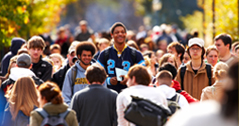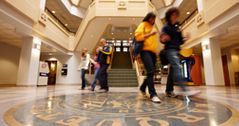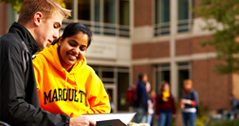The Klingler College of Arts and Sciences builds on the University Core of Common Studies through College Curricula for the bachelor of arts and the bachelor of science degrees that integrates traditional Jesuit principles and educational structures with the demands of an increasingly globalized and rapidly changing world.
The Arts and Sciences Curricula are organized around these essential components:
- The development of fundamental skills of critical inquiry, analysis and expression.
- The development of appreciation for the spiritual and creative dimensions of human life and culture.
- The development of a responsible commitment to the broader social and political communities in which they live.
Rhetoric
- Use the strategies of exposition, analysis, argument, evaluation and interpretation to analyze and compose texts.
- Produce well-organized, well-reasoned and well-supported written, visual and oral texts, given diverse purposes, multiple genres and a variety of audiences and contexts (e.g., thesis-support academic essays, open form essays for public audiences, business documents, oral presentations).
- Explain the importance of ethics in academic, civic and professional applications of rhetoric.
Foreign Languages
The study of languages is the starting point for exploration and understanding of diverse cultures and traditions. Contacts between cultures happen in our own lives every day, and more often than ever before, knowing a second language is essential for being part of a society that reaches around the world. Our language programs in Arabic, Chinese, French, German, Italian, Japanese and Spanish prepare students to interact effectively and engage other people and cultures face-to-face in the most human way possible. Students of Classical languages encounter Greek and Roman civilization as something that is very much a living part of our culture today (philosophy, theatre, poetry, medicine, politics and much more).
Students will be able to:
- Converse with ease and confidence when dealing with most routine tasks and social situations.
- Handle successfully many uncomplicated tasks and social situations related to work, school, recreation and personal interests.
- Begin to narrate and describe in the past, present and future time frames.
- Begin to describe how culture shapes and sustains identity, society and tradition.
Histories of Cultures and Societies
History illuminates every aspect of the human experience -- politics, economics, religion, social issues, art and war. Consequently, the introductory history courses that are part of the college curriculum help students begin to understand society in a comprehensive way. The study of history mines the storehouse of information about the past and orders that knowledge in logical and meaningful ways. It thus shapes our human memory and so equips us to think critically and constructively about the present and our connections to the past.
Students will be able to:
- Demonstrate an understanding of the discipline of history, in particular the application of historical methodologies in the formulation of plausible interpretations of human behavior in past centuries.
- Demonstrate an understanding of how societies develop over centuries through the complex interaction of socio-economic, political, religious and other cultural forces including historical memories constructed by successive generations.
- Demonstrate an understanding of continuities and differences between the past and the present.
Individual and Social Behavior
Anthropology, Criminology, Economics, Political Science, Psychology, Social Welfare and Justice, Sociology
Studying individual and social behavior helps us to understand ourselves and the societies in which we live. Self-identity is constructed through a dynamic interplay of social interactions and societal structures. In turn, societies are similarly influenced by individual behaviors and attitudes, creating evolving forces that continually influence individuals. Each domain of the social sciences brings unique perspectives and contributions to the study of and interventions into individual and social behaviors that inform the others.
Students will be able to:
- Understand central concepts, theories and methods used to explain individual and social behavior in one of the social and cultural disciplines.
- Use knowledge of quantitative and qualitative scientific methods to analyze examples of individual and social behavior.
- Evaluate the applicability of scientific knowledge for understanding individual and social behavior in particular contexts.
Literature
- Produce oral and written assessments of literary and cultural texts using the language and concepts of this discipline.
- Articulate how literary and cultural texts can transform one’s understanding of self, others and communities.
- Apply the methodologies of literary criticism to representative works of literature.
Mathematical Reasoning
- Evaluate the effectiveness of the mathematical sciences in describing the world.
- Analyze quantitative information symbolically, graphically, numerically and verbally for the purpose of solving problems or drawing conclusions.
- Construct logical arguments in support of mathematical assertions.
Philosophy
Philosophy strives to integrate the understanding of all aspects of life into a coherent, rational whole. As such, it plays a crucial role in the "education of the whole person." Philosophy as an investigation of the enduring questions facing humanity -- What is the human being?, What should the human being do?, What is the relationship of the human being to the world around him/herself? and What is the relationship of the human being to the transcendent? -- enables the student to be reflective about his/her life. Philosophy enhances analytical, critical and interpretive capacities that are applicable to any subject-matter and in any human context, and cultivates the capacities and appetite for self-expression and reflection, for exchange and debate of ideas, for life-long learning and for dealing with problems for which there are no easy answers.
Students will be able to:
- Assess views of human nature in various philosophical traditions, including classic Greek and Catholic philosophical traditions.
- Argue for one of the major ethical theories over another in terms of philosophical cogency and practical outcome.
- Use philosophical reasoning to develop their own position on central issues in human nature and ethics, for example; the relation between mind and body, the problem of freedom and determinism, the spiritual and affective dimensions of human life, the extent of human knowledge, the justification of moral judgments and the elucidation of moral norms.
Science and Nature
- Demonstrate knowledge of major concepts, tools and methodologies in one of the natural sciences.
- Understand processes, limitations and ethics of scientific inquiry.
- Use scientific inquiry to solve problems and evaluate information.
Theology
- Describe theologically the basic content of the Catholic faith in relation to other Christian and religious traditions as well as other worldviews.
- Interpret theological texts and frameworks in their historical contexts.
- Articulate implications of Christian faith for growth in holiness and promotion of justice in the contemporary world.
On this page
- Rhetoric
- Foreign Languages
- Histories of Cultures and Societies
- Individual and Social Behavior
- Literature
- Mathematical Reasoning
- Philosophy
- Science and Nature
- Theology
College of Arts and Sciences
- Degrees Offered
- Majors and Minors Offered
- Academic Regulations
- Graduation Requirements
- College Curriculum Requirements
- BA Degree Requirements
- BS Degree Requirements
- Pre-Professional Studies
- Curricula Information
- Arts and Science Special Courses
- Biological Sciences
- Chemistry
- Economics
- English
- Foreign Languages and Literatures
- History
- Interdisciplinary
- Africana Studies
- Applied Mathematical Economics
- Asian Studies Minor
- Broad Field Science
- Broad Field Social Science Minor
- Catholic Studies Minor
- Environmental Ethics Minor
- Ethics Minor
- Family Studies Minor
- International Affairs
- Justice and Peace Minor
- Medieval Studies Minor
- Public History Minor
- Urban Affairs Minor
- Women's and Gender Studies
- Mathematics, Statistics and Computer Science
- Philosophy
- Physics
- Political Science
- Psychology
- Reserve Officers' Training Corps
- Social and Cultural Sciences
- Theology
- Special Programs




 Warning:
Warning:








